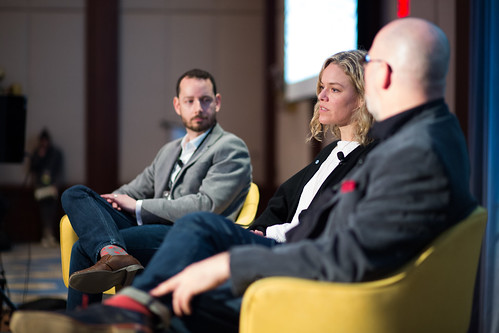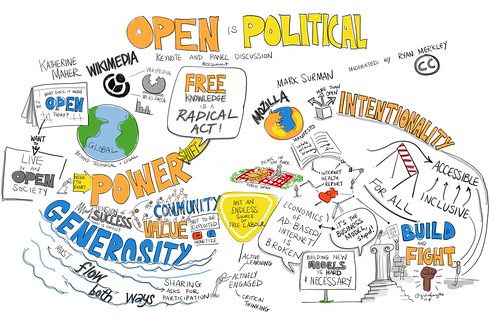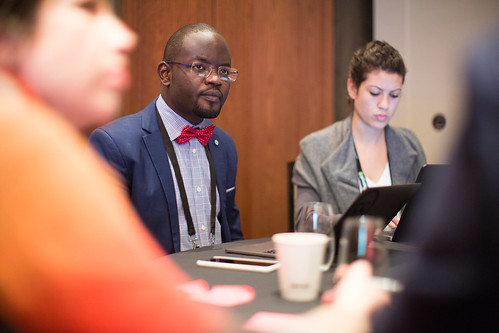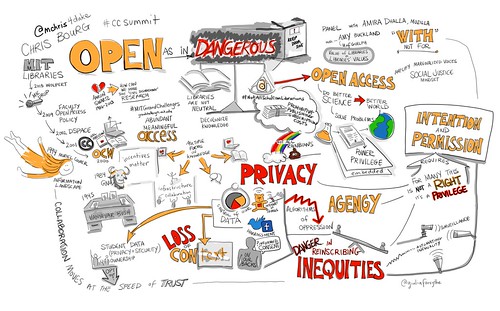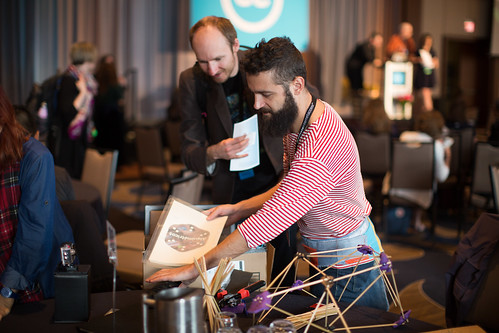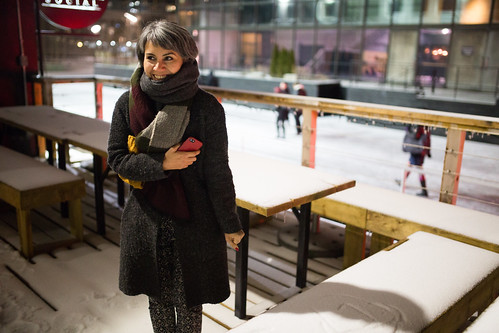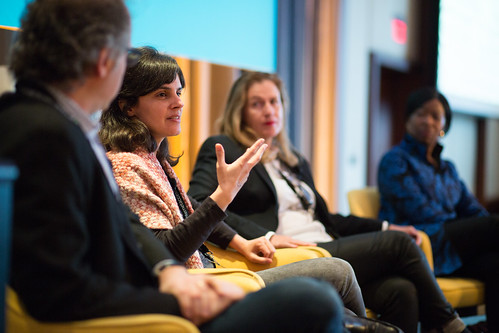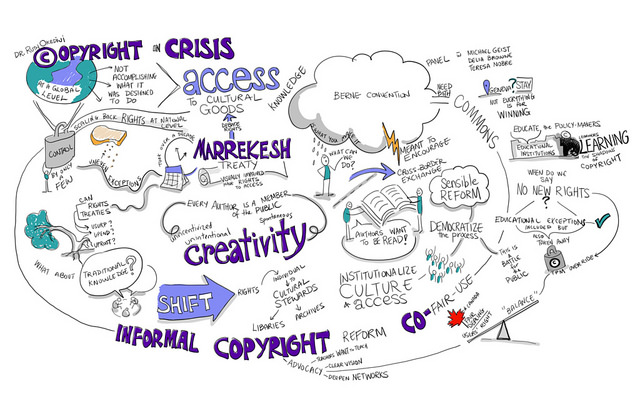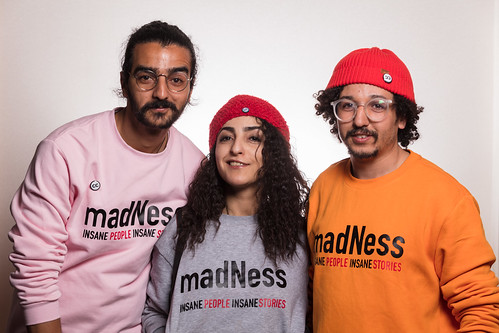Help us protect the commons. Make a tax deductible gift to fund our work in 2025. Donate today!
“Build the Commons, so it is better for all”: CC Global Summit 2018
EventsLike a Creative Commons event, this post will open and close with gratitude.
Thank you to everyone who attended, participated, tuned in, and raised their voices in support of the Commons this April, whether it was in Toronto with 435 other commoners or online through the stream and social feed.
From April 13-15, Commoners gathered for workshops, discussions, seminars, and plenaries about the future of the Commons, the network, and what’s next for our community of sharing. Through snow, raining ice, and bitter cold, we kept warm at the Delta Hotel with a full agenda and the collective excitement of seeing each other, many of us for the first time in a year. (Did we mention we’ll be in Lisbon next year?)
The Summit opened with a packed breakfast for Summit newbies – more than 100 people came to eat and meet newcomers to the CC Community every morning. Arriving to find this year’s Uncommon Women coloring book on their seats and a snazzy new pin in their swag bags, attendees sipped their coffee as they enjoyed a variety of CC items.
https://www.instagram.com/p/Bhl0RA4gU12/?taken-by=creativecommons
Like last year, the opening session began with an invocation by Whabagoon (Patti Phipps-Walker), an Ojibway indigenous elder, who recognized the tribal roots of the land and said “Miig-wetch” (thank you) for our gathering place. Later that day, one of our most popular sessions discussed indigenous cultural heritage and intellectual property and its challenges and futures. In a charged panel, practitioners and academics discussed the historic harm to traditional knowledge and the concept of “sharing” and discussed alternative forms of cultural heritage demarcations, such as Traditional Knowledge (TK) labels.
Kicking off the #ccsummit with @creativecommons coffee and @uncommon_women book! At cc newbies breakfast with lovely new faces pic.twitter.com/mxwx4DwXOp
— Jane Park (@janedaily) April 13, 2018
“Build the commons, so it is better for all”
Wikipedia Executive Director Katherine Maher’s keynote and discussion on Friday asserted that free knowledge is inherently radical. She encouraged our communities to “lean into our values and our value,” and “build for the world we want to have.” Her keynote was a call to action for our communities to come together as a community of practice, resisting enclosures of knowledge and leaning into our collective power. “To be truly equitable, we need to acknowledge that the work is political,” she said. While for some, Open is a hobby or interest, for those at the margins, it can be inherently risky and difficult, a sentiment echoed by second keynote speaker Chris Bourg on Saturday.
Read an interview with Katherine Maher.
In the discussion that followed, Maher discussed the future of the “Big Open” movement with Ryan Merkley, CEO, and Mark Surman, of Mozilla. All focused on the need for the Open Internet as an antidote to the current, broken system of ad-based and surveillance economies. For Open movements, the pull of enclosure and corporate utilization of the commons without giving back represent what the speakers called “the tension of success.” “We need to make sharing reciprocal,” said Maher, bringing the discussion to the need for governance and full community participation. “Participation must be active, not exploitative. We’re building the commons for everyone, not just those who are already in it,” she said.
“Sharing goes both ways: it asks for you to participate, not just consume. We want people to be active on internet” – @krmaher at #ccsummit pic.twitter.com/tX7y4s4iae
— Zack McCune (@zmccune) April 13, 2018
State of the Commons
Another highlight on Friday was the presentation of the first set of data from our annual State of the Commons report. These graphics, commissioned from designer Amy Collier, represented a sample of the full report designed by Affinity Bridge, which will be released this month.
https://www.instagram.com/p/BhjwINtAvCM/?taken-by=creativecommons
“Lift up the people around you”
Many participants attended the Uncommon Women session, where women leaders and allies in the movement discussed inclusivity and the need for more diverse voices in the movement. The Uncommon Women coloring stations throughout the event provided necessary connection and relaxation as well!
I ran into @amirad and @amirad at the #ccsummit !!!!! Thx @uncommon_women pic.twitter.com/O8nocwdskI
— Chris Lawrence #BLM (@chrislarry33) April 14, 2018
Another gold nugget from the @uncommon_women audience: Lift up the people around you, but also practice private and 1:1 affirmations. #ccsummit
— CC Global Summit (@ccglobalsummit) April 13, 2018
Humans of the Commons
Throughout the Summit, more than 60 participants shared their stories at our podcasting popup “Humans of the Commons.” In a specially outfitted space, participants were interviewed by our partners at Loup about their experiences in the movement, their work, and their communities.
View the first stories
"The more I learn about how technology impacts my life and the lives of people around me, the more curious I get"@mozilla's @TheSamBurton talks about how her work and hobbies drive her interest in digital rights at #ccsummit Humans of the Commons Listen: https://t.co/g9IrKqwD8r pic.twitter.com/SU0UYeiLCl
— Loup Design & Innovation (@listening_loup) April 15, 2018
The Future of the Network
During the Summit, our platforms, working groups, and network leaders met to discuss the future of their work. In the next year, the network will focus on recruiting, creating strong local teams, collaboration, and governance. In order to build collective, dispersed power, the network’s working groups and platforms in Open GLAM, Copyright Reform, Open Education, Community Development, Translation, and Communications met to discuss their future and next steps.
Great session on the future of the CC global network with @atarkowski @nicsuzor @claudio @ryanmerkley and others. Most valuable takeaway for me to think about change and new members as additive, not substitutional. #ccsummit
— Meredith Jacob (@meredithjacob) April 13, 2018
Join the network.
Get CC Certified
On Saturday, Jennryn Wetzler, our new Assistant Director of Open Education, opened up registration for the Creative Commons Certificate program this summer. From her blog post: “The CC Certificate provides an-in depth study of Creative Commons licenses and open practices – helping you become an expert in open licensing and the Commons. The program is offered both as a 10-week online course starting in July 2018 as well as a week-long, in-person bootcamp in 2019. In keeping with our values, we will openly license (CC BY) the Certificate content – making downloadable and editable file formats available for informal learning from our website by July 2018.”
Read the announcement
Register now
Excited about new project from @creativecommons: CC Certificates for educators & librarians. Also looking to make course content available CC-BY for informal learning 🙌🙌https://t.co/PSYmkI8brb #ccsummit
— Natalie Colaiacovo (@lilstairz) April 13, 2018
Registration is now open for the @creativecommons Certificate for Librarians and Educators. As one of the beta participants, I highly recommend this course. You can ask me about my experience too. See https://t.co/9TGrEFgVZV #ccsummit pic.twitter.com/j21FdZyjUB
— Regina Gong (@drgong) April 14, 2018
“Collaboration Moves at the Speed of Trust”
MIT Library Director Chris Bourg’s wide-ranging keynote and discussion “Open as in Dangerous,” discussed the need to address the “dangerous” parts of our movements in Open, echoing Maher’s assertion that free knowledge is a political act. “The best librarians are radical,” she said, and not only have libraries “never been neutral,” they “have the potential to be agents of decolonization and social change.” Social justice was a key message in Bourg’s talk, which emphasized the need for open access to knowledge to produce better research, ultimately making the world a more just place. “Individuals who have access to knowledge can lead better and more empowered lives,” said Bourg. In her conclusion, she discussed how online risks mirror real world structural inequalities in their uneven distribution among those with less societal power. “’Open as in Dangerous’ is about loss of control, of privacy. For marginalized people especially, the very danger of being open is the danger of being targeted for abuse,” she concluded.
Read an interview with Chris Bourg.
In the panel discussion that followed, Amira Dhalla of Mozilla, Amy Buckland of University of Guelph, and Bourg discussed the balance of Open, privacy, and sharing. Discussing the need to deemphasize dominant discourses in order to focus on meaningful collaborations that challenge hegemonic structures, the speakers emphasized relationships in subjects like web archiving, privacy, and decolonization in open projects. Intentionality was a key focus for the speakers, who come to Open from a variety of backgrounds. The conclusion of the discussion emphasized the need to build trust into systems, recognizing histories of oppression and colonization that continue to impact the structures of power that exist today.
“Out of that defeat, you were born”
The packed room for Lawrence Lessig’s talk “From Unlocking Free Culture to Reviving American Democracy” listened, rapt, as he outlined his career from copyright to representational democracy. For Lessig, the Eldred defeat was the catalyst for his years of work on the role of big money in government and law, and his founding of Creative Commons in the process.
Like copyright, asserted Lessig, the fight for a more representational government is a fight for integrity. Unlike copyright, people are already convinced – the common view in the United States is that government is nonrepresentational. “Keep your values in sight,” concluded Lessig, after discussing his role as “digital Cassandra” in 2001 and the community’s failing of Aaron Swartz, Creative Commons co-founder. After a moving and inspirational talk, the audience’s appreciation of Lessig’s years of work to end systemic corruption was apparent as they rose in acknowledgment and support.
https://twitter.com/DrRimmer/status/985192747031150593
Open Bazaar
Makers at the CC Summit found their kin at the Open Bazaar, a space to meet and greet projects from around the commons. From Open Textbooks to 3D printing, projects from around the world were represented as part of the meet and greet format.
Having a great time at the #CCSummit – come say hi to Brett and Casey at the Open Bazaar tomorrow, table 22! @creativecommons @ccglobalsummit pic.twitter.com/NpZXqb6RTc
— lil (library innovation lab) (@HarvardLIL) April 13, 2018
Party for the People (of the Commons)
At Boxcar Social, a hip bar on Toronto’s waterfront, Summiteers braved the snow and joined our Commons People Party, a welcoming space where they could warm up with wine, whiskey, and good company. The party featured a screening of Vincent Moon’s Hibridos, the multimedia documentary based on Moon’s travels in Brazil. Read an interview with the filmmaker.
“Cultural goods are not treasure troves to be locked up by the people who can afford them.”
Professor Ruth Okediji, Jeremiah Smith, Jr. Professor of Law at Harvard University and Co-Director of the Berkman-Klein Center, gave the final, resonant keynote of the Summit, focusing on her work for a more just international copyright system. Dr. Okediji stressed the need for better policy to open up resources for equality internationally. She discussed her work on the Marrakesh Treaty, a copyright exception to support individuals with visual impairments, and connected it to the need for expanded exceptions and limitations and a better global copyright policy.
Copyright, she claimed, has become a means of control by the few to dictate the access of the many. “Authors want to be read,” she asserted, and said that the use of copyright as a means of control is “troubling.” In the panel discussion that followed, Dr. Okediji discussed the future of copyright with Teresa Nobre, CC Portugal Legal Lead, Michael Geist, Canadian Research chair at University of Ottawa, and Delia Browne, Australian National Copyright Director. In the discussion, they talked about the need for sustained engagement with copyright policy. In the words of Dr. Okediji, “We don’t win just by showing up at the end.” Copyright as a tool to empower citizens and create power through access was a theme in the discussion, which brought together some of the most important lawyers working on exceptions and limitations today.
“Education is vital” Ruth Okediji responding to the copyright battle in Canada & EU on panel w/ @mgeist @tenobre @deliabrowne #ccsummit pic.twitter.com/xRZfGUj60u
— Abby Cabunoc Mayes (@abbycabs) April 15, 2018
“The most fitting way to do justice to the legacy of Bassel Khartabil and his family, is to lift up the voices of those like him.”
On Sunday, we announced the inaugural recipients of the Bassel Khartabil Free Culture Fellowship and Memorial Fund with our partners. After a statement from filmmaker Dana Trometer, a friend of Khartabil’s, the fellowship was awarded to Majd Al-shihabi, a Palestinian-Syrian engineer based in Beirut whose work focuses on oral history and the digitization of public domain Palestinian maps. The Fellowship was presented alongside three inaugural Bassel Khartabil Memorial Fund grants, awarded to Egypt-based The Mosireen Collective, and Beirut-based organizations Sharq and ASI-REM/ADEF Lebanon (Arab Studies Institute-Research and Education Methodologies / Arab Digital Expressions Foundation).
After the presentation of the awards, award-winning filmmaker Yasmin Fedda screened part of her upcoming film Ayouni, still in production, which will focus on the more than 10,000 disappeared people of Syria, including Khartabil. The film’s footage tells the tragic story of Khartabil and his wife, human rights lawyer Noura Ghazi, who has been fighting for justice since his disappearance in 2012.
“Realizing the full potential of the creative spirit that is demonstrated by the internet”
Over lunch, participants enjoyed a “fireside chat” on the past and future of Creative Commons with Molly Van Houweling, Lawrence Lessig, and Claudio Ruiz.
Learn to think like a creator of open content
https://twitter.com/yoelopio/status/985885988412182528
As usual, the creativity of our community was on full display at this year’s Summit. From the whimsical swag to the gorgeous window displays of our community’s photos, we lit up the commons through photography, video, and even live theater – the Summit concluded with a performance of CC Portugal’s “Copywrong” play.
Photographer Sebastiaan Ter Burg’s openly licensed photos capture the faces and moments that made the Summit shine.
View them all
To close with gratitude, thank you. Thank you to the 435 attendees from 64 countries, the 192 speakers, the 26 volunteers, the staff, the programming committees, the sponsors, and the Commoners who traveled a collective 1.56 million kilometers to join together and share in our community. Until next year in Lisbon!
So much gratitude for everyone at the CC Global Summit this weekend. See if you can spot yourself in this video of great #ccsummit moments by @ter_burg. https://t.co/F71OlFPAOz
— Creative Commons (@creativecommons) April 15, 2018
All photos linked to source, most photos CC BY, Sebastiaan Ter Burg, except Keynote Drawings by Giulia Forsythe, CC BY and CC0
Posted 01 May 2018
